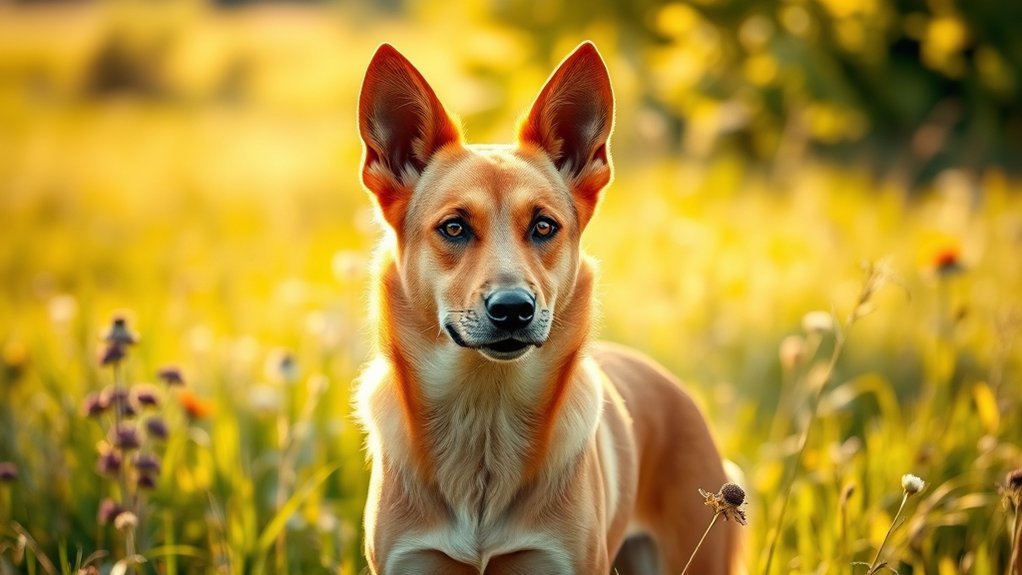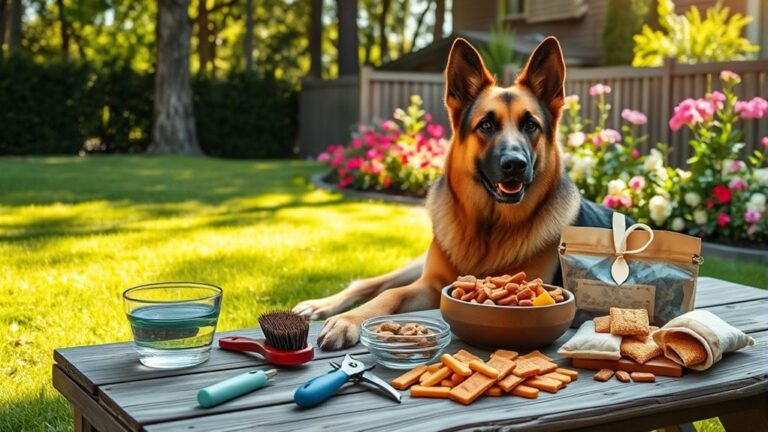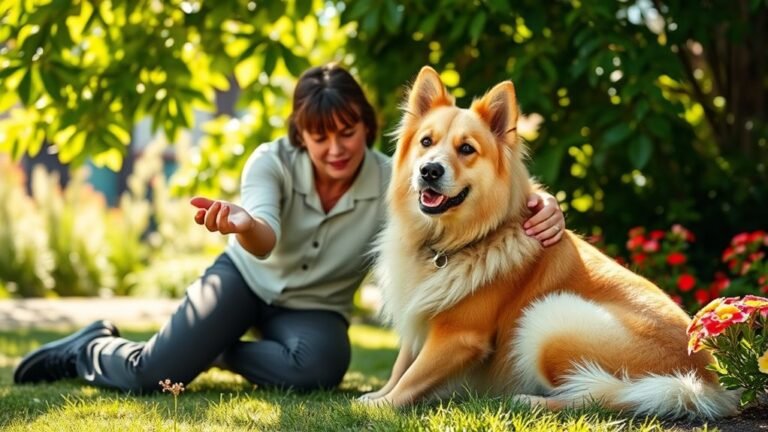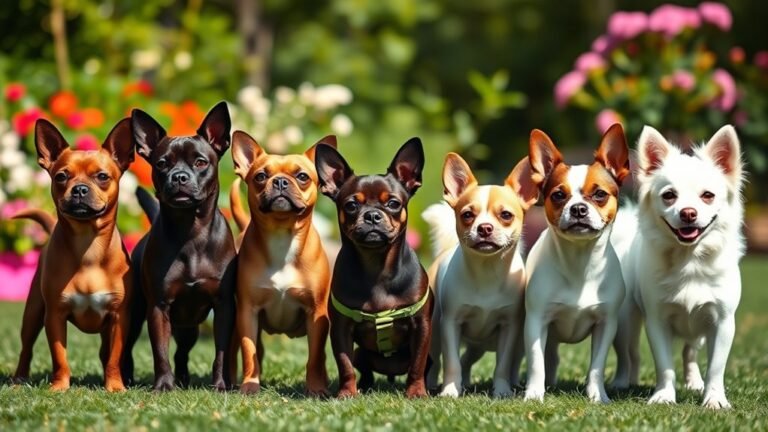America’s Dingo: Unraveling the Carolina Dog
The Carolina Dog is often called "America's Dingo." This breed has a fascinating history. It is closely linked to early humans and Native American culture.
Carolina Dogs have special features that make them different from many other breeds. They have a unique look and personality. But owning a Carolina Dog is not just about how they look. They need specific care and understanding.
Their behavior can be tricky for some people. They may not be the best choice for first-time dog owners. Learning about their needs is important.
What will you discover about this interesting breed? If you are thinking of getting a Carolina Dog, be ready to learn and grow with them. They offer a lot of joy but also require effort.
Key Takeaways
The Carolina Dog is a special dog breed with deep roots in Native American history in the southeastern U.S. This breed has a slim body, triangle-shaped ears that stand up, and a coat that can be sandy yellow, reddish-brown, black, or white.
These dogs are playful and love to have fun. They are also independent and very loyal. They can tell how humans feel, showing they are sensitive to our emotions. It's important to start training and socializing them when they are young. This helps them grow into happy and well-behaved dogs.
For health, Carolina Dogs need a diet high in protein. Regular visits to the vet are also important to check for common health issues like hip dysplasia and skin allergies. Taking good care of your Carolina Dog helps them live a long and happy life.
The Origins of the Carolina Dog
The Carolina Dog is a special breed with an interesting past. Unlike many dog breeds that have clear histories, the Carolina Dog's background is more of a mystery. People think it comes from very ancient dogs that lived long ago with early humans.
These dogs have strong ties to the Native American tribes in the southeastern United States. They were more than just pets; they helped people survive. This close relationship shows how these dogs adapted to living with humans over time.
By watching how Carolina Dogs act, we can learn about their history and the way they grew alongside people. They remind us of an important part of America's past.
The Carolina Dog isn't just a breed; it's a part of our shared story.
Physical Characteristics and Appearance
When you look at a Carolina Dog, you immediately notice its special traits. This breed has a lean and fit body that helps it move quickly and easily. Its ears stand up tall and have a triangle shape, which makes the dog look alert and ready.
Carolina Dogs come in different colors. You might see them in sandy yellow, reddish-brown, black, or even white with patches. This mix of colors is really eye-catching.
Their tails are often curled up or held high, adding to their proud look.
The Carolina Dog has a nice build that helps it run and play. This makes it a great companion for those who appreciate beauty and strength.
Temperament and Personality Traits
The Carolina Dog has a fun and playful temperament. They bring joy and energy to your home. This breed knows how to balance being independent and loving.
They form strong bonds with their families and show loyalty. Once they trust you, they stay by your side and protect you without being mean.
You can see they're alert and smart, picking up on your feelings easily. This mix of traits makes the Carolina Dog not just a pet but a true part of your family.
They help create a feeling of safety and belonging that many dog owners really appreciate.
The Carolina Dog's Habitat and Adaptations
The Carolina Dog is a smart and adaptable breed. It can live in many types of places. This dog feels most at home in spots that remind it of where it came from.
Here are some places where you might see the Carolina Dog thriving:
- Subtropical forests: These areas give the dog shelter and food.
- Grasslands: Here, the dog has plenty of room to run and hunt.
- Coastal regions: The beach offers many different choices for food.
- Rural areas: In the countryside, these dogs can live freely without the busy city life.
The Carolina Dog is good at finding food and staying safe in its surroundings.
When you watch this dog in nature, you can see its graceful movements and sharp senses.
It's great at surviving in different places, showing how strong and resilient it is. This breed truly connects with its wild roots.
Breed Recognition and Status
The Carolina Dog is a special breed, even if it isn't as famous as some others. Dog lovers find it interesting because of its unique history and traits.
However, it doesn't have official recognition from big groups like the American Kennel Club. This means not everyone knows about it, and it can affect how popular the breed is.
Some organizations recognize the Carolina Dog, but it still isn't officially registered. This can make people unsure about getting one as a pet.
But for those who love this breed's wild background, there's often a strong bond with its unique nature and personality. If you're thinking about welcoming a Carolina Dog into your home, know that you're choosing a breed with an interesting heritage.
Training and Socialization Tips
Training a Carolina Dog can take time, but with the right methods, you can see great results. Building a strong bond through positive reinforcement is key. This means using treats and praise to reward your dog when they behave well. It helps them trust you and want to learn more.
Early socialization is also important. This means getting your dog used to different people, places, and animals. Doing this can help prevent behavior problems in the future.
Here are some helpful tips:
- Use positive reinforcement: Give your dog treats or praise for good behavior.
- Start with basic commands: Teach simple commands like sit, stay, and come. This gives your dog a solid start.
- Gradually expose them to new experiences: Introduce your dog to new things slowly. This makes them feel less anxious.
- Be patient and persistent: Stay calm and keep trying. Progress may take a little while, but it's worth it.
With love and patience, your Carolina Dog can learn to be a great companion!
Health Considerations for the Carolina Dog
When you think about getting a Carolina Dog, it's important to know a few health facts about them. These dogs need special food that's high in protein to keep their energy up and help them grow.
Like all dogs, Carolina Dogs can get some common health problems. They might have hip dysplasia or skin allergies. To catch these issues early, it's a good idea to take them to the vet regularly.
Also, watch their weight to keep them from getting too heavy, which can cause other health problems.
The Carolina Dog in Modern Society
The Carolina Dog is finding its place in today's world. More people are noticing its unique qualities and how well it can adapt.
This breed does well in cities. You can see Carolina Dogs in many spots, like:
- Urban parks where they meet dogs of all kinds
- Homes where their loyalty and protective nature are cherished
- Community events that highlight their interesting history
- Rescue groups that help them join loving families
As people learn more about the Carolina Dog, they see its special charm. This breed helps bring people together.
It creates a sense of community among those who admire its strength and personality. Overall, the Carolina Dog helps build tighter bonds in modern life.
Myths and Misconceptions
Many people have misunderstandings about Carolina Dogs. One big myth is that they're wild and don't like people. This isn't true! Carolina Dogs do well with families and enjoy spending time with humans.
Another myth is that they can't be trained because they come from wild ancestors. Actually, Carolina Dogs can learn well with the right training.
Some folks believe that these dogs need a lot of open space to run around. While they enjoy being outside, they can live in different places, as long as they get enough exercise.
It's important to clear up these misconceptions. When we understand Carolina Dogs better, it helps new owners see how special they are. This can make it easier for people to bring a Carolina Dog into their home and feel good about it.
Embracing the Carolina Dog: Ownership Insights
Bringing a Carolina Dog into your home means you need to understand their special traits and needs.
This way, you can build a joyful bond with them. Here are some friendly tips for Carolina Dog owners:
- Grooming: Carolina Dogs have short fur, so they don't need a lot of grooming. Just brush them regularly to help with shedding.
- Diet: They need good food that's rich in protein. This matches their natural hunting background.
- Exercise: Make sure they get daily exercise. This keeps them happy and energized.
- Socialization: Start socializing them early. This helps them behave well with people and pets.
Frequently Asked Questions
Are Carolina Dogs Good With Children and Other Pets?
Carolina dogs can be great friends for kids and other pets. If you start training them early, they learn how to get along well with everyone. Playtime is important! When you play with them regularly, they become more friendly and happy. This helps make your home a fun and peaceful place for everyone. So, give them lots of chances to meet kids and pets. They will learn to enjoy their company!
How Long Do Carolina Dogs Typically Live?
Carolina dogs usually live between 12 and 15 years. Their lifespan can change depending on their health and the care they get. Taking good care of them and taking them to the vet regularly can help them live a longer and healthier life.
What Is the Best Diet for a Carolina Dog?
To take care of your Carolina dog, you need to give it good food that meets its needs. Choose high-quality dog food that has the right mix of proteins, fats, and carbohydrates. Keep an eye on how much you feed your dog. Adjust the portions based on how active it is, so your dog stays healthy and happy.
Do Carolina Dogs Shed a Lot?
Carolina Dogs do shed, but it's not a lot. They lose some fur, and you can see when they shed. Brushing them regularly helps. It keeps their fur healthy and lessens the mess around your home. Plus, it's a nice way to spend time together. So, don't worry too much about shedding; just keep up with their grooming, and you'll both be happy!
How Much Exercise Do Carolina Dogs Require Daily?
Carolina Dogs need daily exercise to stay healthy. Make sure they get at least an hour of fun activities, like walking or playing. This keeps them happy and helps them feel good. Watch how active they are, and you'll see they enjoy it! Always remember, exercise is important for their well-being.







